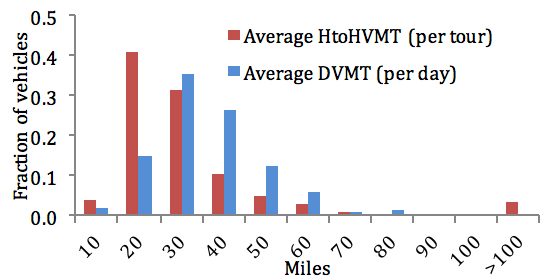Analysis of Utility Factor of Plug-in Hybrid Vehicles Using Longitudinal GPS Data with Spatial Information
Project PI
Dr. Xing Wu, Assistant Professor, Department of Civil and Environmental Engineering
Short Description
This project estimated the utility factor (UF) of plug in hybrid electric vehicles (PHEVs), using spatial, longitudinal travel data of 415 vehicles over 3-18 months in the Seattle metropolitan area, and compared the results with those from the existing research based on the National Household Travel Survey (NHTS) data.

Full Description
Plug-in hybrid vehicles (PHEVs) combine an internal combustion engine (ICE) with a battery which can be charged with grid electricity. PHEVs can operate in the charge-depleting (CD) mode, in which little or no fuel is consumed. After the CD range is exhausted, PHEVs can continue to operate in the charge-sustaining (CS) mode, running on gasoline, in virtually the same fashion as a hybrid electric vehicle (HEV). Therefore, the effectiveness of a PHEV depends on the proportion of the distance driven on electricity, or in other words, a weighting between CD mode and CS mode. The Society of Automotive Engineers (SAE) introduced a term "utility factor" (UF) and a standard method to determine the UFs of PHEVs, simply based on daily vehicle miles traveled (DVMT).
Recently, with the availability of the travel data recorded by global-positioning-system (GPS) devices in vehicles, the temporal and spatial information of trips makes it possible to analyze the UFs based on the actual travel behavior of motorists. The trips of each vehicle were combined into a series of home-to-home tours (as we only consider home chargers). The distance of each tour and the dwell time between two successive tours were found. Then the UFs were calculated based on these home-to-home tours. Compared with the DVMT-based method, this method captures the variance of the heterogeneous travel patterns.
Funding
This project was funded by US Department of Energy (as a sub-contract from Oak Ridge National Laboratory).
Publications
- Wu, X., Aviquzzaman, M. and Lin, Z. (2015) “Analysis of plug-in hybrid electric vehicles’ utility factors using GPS-based longitudinal travel data”, Transportation Research Part C, Vol. 57, pp. 1-12.